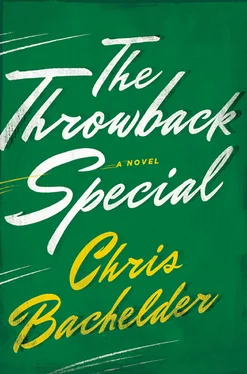“What about Christmas?”
“Dad, I told you, I think we’re going to Grandma’s.”
In the machines there were rows and rows of snacks and candy. There they were, in full sight, bright and satisfying and twenty-five percent larger. The vending alcove operated by the honor system. Jeff was bound by his honor not to tip the machine over and smash it open with his Gary Clark helmet.
THE FIGURE AT THE FAR END of the fourth-floor hallway seemed inhuman in its shape and movement. It was Myron. Chad had bestowed upon him the Rick Donnalley gear, but Myron had yet to bestow his Leonard Marshall gear upon Vince, whom he could not find. Thus Myron was one of several men who trudged a long hallway with two bulky sets of gear and a faraway look in his eyes. When he slowly emerged from silhouette, the men in their doorways could see that his face had a startled look, and that two helmets hung like decapitated heads from his hooked fingers. After some confusion and misinformation, Steven explained to the tight ends that the Gorgon was a type of monster, and that the Medusa was the name of a specific Gorgon. Also, that Perseus had beheaded Medusa, though Perseus had not beheaded Medusa in a giant maze.
And where was Fat Michael?
He was in the stairwell between the second and third floors, hiding from Peter, who was searching for him.
Why?
To give him the Theismann gear.
No, why was he hiding?
It’s difficult to say.
Was it unusual for the man selected to play Theismann to hide in the stairwell?
No.
Did hiding remind Fat Michael of anything from childhood?
There was a boy he used to hide from with some frequency. The boy had a metal leg brace, and Fat Michael could always hear it creaking and thumping as the boy climbed the front porch of the foster home. He hid beneath his bed as the boy rang the doorbell.
Why did he hide?
He didn’t want to see that boy.
Did Fat Michael like his nickname?
No. Would you?
How was Fat Michael passing the time in the stairwell?
He was lining up the bodies of dead ladybugs. There were nine. Then some light stretching.
Would Fat Michael have come this weekend if his missing dog had not returned late last night, smelling like garbage?
It’s difficult to say.
Would Peter ever find Fat Michael?
Yes, Gil would eventually tip him off.
What would Peter say to Fat Michael?
He would say that everyone should play Theismann once. He would say it’s hard to explain, but it’s an intense experience. What he would mean was that it’s powerful to relinquish control, particularly for those men, like Fat Michael, who are determined never to relinquish control.
Why did Peter always wear that mouthguard?
It made him feel safe.
What would Fat Michael say?
He would say not to call him that.
What else would he say?
He would ask Peter about the drought and a new operating system.
Would he apologize?
There would be no need.
Would he clack the shoulder pads with his fist?
Yes.
Would anyone else join them there?
Terence, a guy from Prestige Vista Solutions.
What would the men’s voices sound like in that stairwell?
Hushed and loud at the same time.
CHAD WALKED ALONG the fourth-floor hallway. He had no shadow, and his feet made no sound as he walked. The hotel had transformed his sense of scale and reference. Chad had ceased being a discrete unit of biological meaning. It felt okay. The sound from Room 414 may or may not have been a cat.
It was not yet late, but many guests had already hung their lewd Do Not Disturb signs from their door handles. Chad thought of them as Do Not Disturb signs, though in fact they did not say Do Not Disturb . There were no words on the signs at all. At some point in the history of hospitality, it occurred to Chad, the Do Not Disturb sign had become symbolic, metaphorical. It no longer utilized the crude and literal three-word injunction that ineluctably suggested wanton acts within. These signs on the fourth floor featured a sprig of bamboo leaning evocatively against a lurid stack of polished black wellness stones. This ideograph, as it turned out, was no less prurient than the old imperative, though it was no doubt more sensual than carnal. Moving noiselessly through the hall, imagining the varieties of intercourse to his port and starboard, Chad collected the signs from the door handles as he passed.
In an attempt to avoid Andy and Nate, Chad stepped into an elevator containing Andy and Nate.
“We were just looking for you,” Andy said.
“Me, too,” Chad said as the doors closed.
The men were quiet as the elevator dropped slowly toward the lobby. Andy took a long, slow drink from his red cup. Nate stared at the illuminated number above the doors, confirming the descent. Chad looked down at the shoes his wife disliked so forcefully. His wife’s contempt for the shoes was in fact their primary feature, more salient than their color, style, material, or comfort. He could not even see the shoes anymore. He could see only that face she made. The shoes were haunted. Why did she insist on expressing her disdain for these shoes? Or put another way, why did he continue to wear them? On the floor was a sticky note that read 45 DAYS . Chad felt trapped. The elevator stopped on the first floor, and the men got out. Standing on the floral carpet, Chad suffered that fleeting vertiginous wobble that health experts in an Internet anxiety forum had diagnosed as either an inner ear malady or multiple sclerosis. Nate felt it, too, an unpleasant dipping sensation, his assiduously untested hypothesis having always been that the operations of the elevator create tremors and vibrations in the hallway area in the immediate vicinity of the shaft.
Without speaking or conferring in any way, the men turned and walked down the hallway toward the side exit of the hotel, and it seemed to each man that their pace slowed as they neared the door. Outside the exit, there was a picnic table next to a dumpster, and it was there that these three men traditionally convened for a post-lottery smoke. During the year, however, Chad had quit smoking, and he had yet to tell Nate and Andy. He did not know Nate and Andy well. He saw them once a year, and these nighttime smokes by the hotel dumpster were the sole basis of their friendship. They had created sub-tradition, sub-community. Chad had not quite articulated this to himself, but he felt that it would be inhospitable not to smoke at the picnic table with Andy and Nate. It would perhaps be construed as a renunciation, or as a claim of superiority or judgment. Because he saw them only one weekend per year, it might seem to them that the reason he had quit smoking was that he no longer desired their friendship, when in fact there had been other reasons that he had quit smoking cigarettes. He did not want the other men to think that he did not value their company, though in truth he valued their company only very slightly.
Nate, also, had quit smoking nine months ago, but was reluctant, obviously, to tell Chad and Andy. For Nate there was something distasteful, almost shameful, in quitting. Doctors and schoolchildren and righteous billboards were always exhorting him to quit, and even though they were right, Nate found repugnant the notion that he must capitulate. It made him feel like a child, and he hated being made to feel like a child — though he supposed that Charles would say that nobody can make you feel anything. He had wanted to quit, of course, but to quit was to obey, to be good instead of bad, and he did not want to admit to annual smoking friends that he had surrendered.
Andy had also quit smoking during the year, but he simply could not find a way to tell Chad and Nate. Andy had quit smoking numerous times in the past — in fact, a year ago when they had smoked beside the dumpster, Andy had not previously smoked in six months — and he had become sheepish about the very attempt to quit. He was reluctant to tell the other two because he did not want to see the knowing smirks, the nods, the raised eyebrows of men who very well knew he could never really quit. “Let us know how that works out for you,” one of them might say. “Good luck with that,” the other might say, though in fact it was difficult to imagine either Chad or Nate saying such things. The three men moved toward the exit door with lassitude and dread. They might never reach the door. A desk clerk watching the men on closed-circuit television might have thought they were demonstrating one of the paradoxes of motion, though the desk clerk was not watching the monitor but instead reading Ayn Rand’s The Fountainhead . Each man, it is true, was also beginning to crave a cigarette.
Читать дальше












